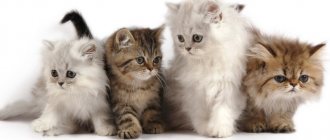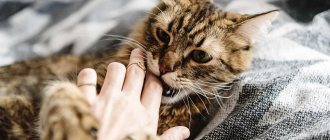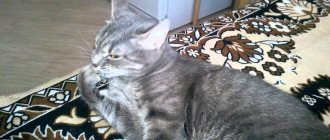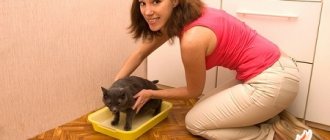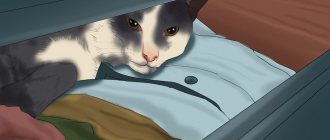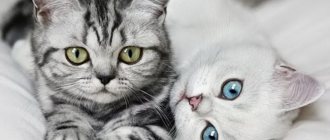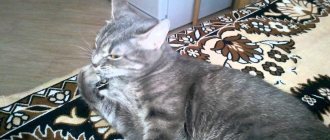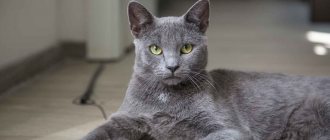Winston Churchill said: “He who cannot understand his cat cannot understand anything at all.” But these incredible animals often cause surprise and misunderstanding among owners. Many cats love to “treat” their owner with a freshly caught mouse or other dubious treat. Another nuance - most cats prefer to drink water from the toilet, avoiding the bowl. And this is only a small part of the characteristics of pets. Many of the “oddities” turn out to be not so harmless, for example, when a pet starts chewing shoes. What is the reason for this behavior and is it possible to rid the animal of a bad habit?
Cat chews shoes
Winston Churchill said: “He who cannot understand his cat cannot understand anything at all.” But these incredible animals often cause surprise and misunderstanding among owners. Many cats love to “treat” their owner with a freshly caught mouse or other dubious treat. Another nuance - most cats prefer to drink water from the toilet, avoiding the bowl. And this is only a small part of the characteristics of pets. Many of the “oddities” turn out to be not so harmless, for example, when a pet starts chewing shoes. What is the reason for this behavior and is it possible to rid the animal of a bad habit?
The main reasons why cats chew shoes
Most often, dog owners experience damaged shoes. This is mainly the case with puppies and young dogs who get bored. But, as it turned out, cats can also harm shoes and slippers, using their strong, sharp teeth. Thanks to many years of observations, it was possible to identify the main reasons for this strange behavior of the baleen-stripes.
Physiological factors
Deterioration in health and the development of various pathologies can cause nervousness in the pet. He begins to get nervous and play dirty tricks, including trying to steal his owner’s shoes. Among the diseases that provoke this behavior are:
- dysfunction of the gastrointestinal tract;
- heartburn;
- increased acidity in the mouth;
- development of diseases of teeth and gums: gingivitis, caries, tartar, plaque.
Replacement of teeth in the younger generation.
When kittens' teeth change, they can also chew on various objects, including their owner's shoes.
In some cases, this process is asymptomatic. But sometimes the change of teeth is accompanied by increased salivation, the baby licks himself more often than usual and smacks his lips. Kittens experience the greatest discomfort and pain when replacing their molars.
Instincts
Innate tendencies and desires, determined by nature, also cannot be written off. Moreover, they are practically uncontrollable. Let's look at the most common of them.
Smell that attracts animals
Foot odor emanates from shoes, and it is often quite intense and specific. With sweat, a number of secrets are released that irritate the cat’s psyche on an instinctive level. By chewing shoes, a pet may try to “transmit” certain information to its owner - offer friendship, flirt, show superiority, and even threaten.
Applying a mark
In nature, cats, like other predators, tend to leave marks on the borders of their territory. By spraying objects, they warn other animals that she is busy. If a cat ruins shoes for this purpose, it does not mean that she is trying to dominate. The pet simply “talks” about a sense of ownership.
Leaving his scent on the shoes, the cat warns competitors: “This is my man, and you better not come close to him. I will stand up for him."
Don't be surprised by the unpredictability of these purrs. Even sabotage can be a sign of their care and affection.
Showing emotions
This reason can be called the most popular, especially when it comes to such emotional animals as cats. They can cause harm with any change in mood, especially against the background of experiences:
- Lack of attention - the behavior of even the kindest and most sympathetic pet can change significantly. An affectionate cat becomes aggressive, including showing dissatisfaction with its beloved owner.
- Lack of socialization - it is recommended to instill household habits in your pet as soon as it appears in the house. And although cats are not as flexible as dogs, they still have high intelligence and immediately grasp what can be done and what it is advisable to avoid.
- Anxiety or fear – a fearful, anxious purr may be accompanied by worsening behavior. He may start going to the toilet in the wrong place, sharpening his claws where he shouldn't, or gnawing on various objects that are not toys. Also in this case, the pet’s sleep is disturbed; he may not sleep for a long time or twitch in his sleep.
- Self-esteem – Most cats have significantly inflated self-esteem. Representatives of many breeds have this quality. Among Siamese, British Shorthairs, Abyssinians, Bengals, and Siberian cats, real dictators are often found. In fact, many of the cats tend to consciously assert themselves in the family, occupying not the lowest rung in the hierarchy system. However, the owner should not ignore such attacks.
How to identify the cause of incorrect behavior
It’s easier said than done, but there is no other way out. To stop a cat from chewing shoes, you need to understand why she does it. Long-term observations of domestic animals have allowed people to understand some algorithms on which we will rely. For convenience, we will divide the possible reasons into groups.
1. Physiology – that is, the health and well-being of the pet.
Disease - an adult cat chewing shoes can pursue the goal of breaking a diseased tooth . Problems with the gastrointestinal tract, heartburn, increased acidity in the mouth, inflammation of the gums, caries, tartar or plaque - all these are good reasons for damage to your slippers and boots.
Teeth Change – A kitten going through the eruption of its molars will suffer from severe discomfort and itching. The materials from which the shoes are made are strong and soft enough to comfortably solve itchy problems.
2. Instincts - that is, desires determined by nature that the cat cannot control or can, but with difficulty.
Attractive smell - shoes smell like feet, and for some people this smell is very specific and strong. With sweat, a person secretes certain secrets that irritate the cat’s psyche on an instinctive level. By chewing shoes, a pet can literally flirt (flirt), threaten, fight, or try to make friends with the owner of these very shoes.
Marking – as you know, cats tend to mark their territory with their own scent. If a cat pursues this goal by chewing shoes, we are not talking about dominance, but about a sense of ownership. Leaving a smell on the owner’s shoes, the pet declares to competitors: “Mine, don’t come close to anyone, I will defend this person.” Don’t be surprised, but with a habit that seems harmful at first glance, a cat can express affection.
3. Emotions are the most popular reason for damage to the owner’s personal belongings.
Lack of attention - not many people imagine what actions an animal that is deprived of attention is capable of. Even aggression towards family members is most often explained by loneliness. Socialization of an animal is the first and most important brick in the foundation of education.
How to stop a cat from chewing shoes
If a pet that does not have problems with physical health and psyche harms its owner and chews shoes, then you can use products that have an unpleasant odor for felines. Shoes are sprayed with special compounds that are sold in pet stores or other means are used:
- cayenne pepper (chili) is mixed with water;
- orange oil – 1 part diluted in 3 parts water;
- rosemary or peppermint oil.
In addition, you should not provoke your pet and leave shoes in a visible place, at least until he loses interest in them.
In most cases, with a competent approach, it is possible to wean a pet from a bad habit without physical influence or punishment. In the process, the owner gets to know his furry friend better and finds the most effective method and individual approach.
Source
Folk remedies
Many cats don't like the smell of citrus fruits. Therefore, you can try putting grapefruit, lemon or orange peels in the places where you store your shoes. For example, they can be placed under the rug, in the closet, and also in the shoes themselves.
Rub the floor in the hallway with lemon juice, this can also scare away the kitten. Some pet owners recommend using citrus essential oils to treat items that animals chew on. But since the oil leaves a greasy sheen, it is better to apply it to a cloth or cotton swab and place it close to the shoes. In addition to essential oils, star liquid balm has a similar effect.
A spray bottle of water gives good results in raising kittens. As you know, almost all cats do not like water. When you catch a kitten doing something related to damaging things, you need to spray it a little with a spray bottle. With such training methods, four-legged pets usually quickly begin to understand that they will be punished for bad behavior.
Under no circumstances should an animal be punished by depriving it of food or locking it in the bathroom. Because the animal will not understand that you punished it, and there will definitely be no benefit from it. Also, you cannot beat a kitten, but for educational purposes you can raise your voice at him, making it clear that you do not like his behavior.
Source
the cat carries things in its mouth and yells at the whole apartment
I don’t agree 90% with the fact that many older cats scream at night. If the cat is healthy, then at that age it is accustomed to the owner’s regime. And usually sleeps at night.
leno4ka_air, at what age did you spay your cat if she still has a hairless belly?
Only registered users have the ability to start new topics. Register and log in to the site by entering your username and password on the right side of the window, and you can start a new topic.
Before visiting the forum, read the topic: “How to properly consult a veterinarian,” as well as the list of answers to frequently asked questions, this will help you save your time and get an answer to your question faster. Pay special attention to the document: Symptoms of animal diseases. Perhaps in your situation you cannot expect an answer on the forum, but you need to urgently call a doctor or take the animal to a veterinary clinic!
How to solve the problem of perverted appetite
The decision will depend on the reason. Let's look at each point in more detail:
- behavioral problems. Remember if any event occurred before the start of eating various objects that could cause stress for the animal. This could be a trip to visit or to a veterinary clinic, for example. If the situation exists, then you can try using sedatives. The simplest of them is a spray to correct behavior disorders. It is used for cat resting areas. If it doesn't help, buy drops that can be applied to the withers. If you clearly understand that you have recently forgotten about your cat, are not paying enough attention to it, and are not playing with it, then a perverted appetite may be a reaction to your distance. Try to compensate for the care and attention, pet the animal more often, offer various treats for correct behavior, buy new interesting toys;
- diet issues. If the animal receives high-quality ready-made dry food, usually this problem does not arise, but it is difficult to feed it correctly with natural food, it is better to contact a specialist to draw up a diet;
- vitamins and minerals. If the issue of perverted appetite affected you in the spring, then most likely there is a lack of nutrients in the pet’s body. Introduce vitamins and minerals into your diet. If the animal eats woolen items and kitchen towels, add bran. If your pet shows interest in its own feces, it is most likely lacking potassium and phosphorus; you can also purchase them separately. The problem can also be solved by switching to fortified feed;
- worms. Even if a cat does not go outside, it can become infected with worms. Therefore, it is necessary to carry out appropriate treatment of the animal. This is done at least once every six months for a pet, and once every three months for those that visit the street;
- diseases. If a cat is sick with something, then most likely other symptoms will be added to the perverted appetite: anxiety, vomiting, diarrhea, fever, apathy, etc. Monitor your animal closely, or better yet, consult a doctor.
If you cannot independently find the cause of your animal’s incomprehensible eating behavior and solve it, it is better to get examined by a veterinarian and not risk your pet’s health.
Smell, you're familiar to me
The familiar smell is one of the obvious reasons explaining the reverent attitude of tailed animals towards shoes. The sense of smell of small predators is almost 15 times sharper than that of humans. In addition, they have the ability to receive information literally out of thin air thanks to a special vomeronasal organ, named after the Danish physiologist Jacobson. It consists of tiny sacs lined with highly sensitive epithelium, capable of reacting to literally one trillionth of a gram of a substance.
This keen sense of smell makes cats show interest in new smells and look for familiar and familiar ones. Animals have special glands on their forehead and cheeks, and by rubbing their muzzle against a person or object, the cat leaves its own unique mark, which signals its belonging to the space and, accordingly, the safety of the explored territory. Cats are drawn to things that have their own or a similar scent on them. Therefore, if the furry majesty deigns to rest in slippers, it thus demonstrates complacency, loyalty, its own comfort, trust and love for the owner.
Stress management
There is no need to think that the life of pets is always easy and carefree. They, just like people, are capable of experiencing stress. And sleeping on the owner’s shoes is a kind of relaxation room for them. Feeling the scent of its beloved owner, the cat feels protected and knows that he will definitely return in the evening. Therefore, cats often even drag shoes and sneakers to another place - where they like to relax most.
What to do if the cat has chosen shoes for constant sleep?
If you are happy that your pet chose boots as a bedroom, you can leave everything as is. Otherwise, depriving him of his favorite bed can cause bewilderment and resentment. A good way is to place shoes on out-of-reach shelves. But they should be closed, since the mustachioed striped ones climb and jump well and, if desired, will conquer the desired peak without any problems.
You can try to redirect the pet's feelings to another item that belonged to the owner - an old blanket, an unnecessary T-shirt, a lost pair of socks. If you act aggressively and shout at a cat trying to rest in an expensive shoe or drag a house slipper into unknown distances, then this will not give much result. And the animal will be scared and upset, because it simply does not see anything wrong in its own actions.
Therefore, if the cat does not spoil the shoes - does not scratch or mark, let him sleep peacefully. After all, wiping the insole or throwing the slippers into the washing machine is a matter of a couple of seconds. And the wordless expression of sincere sympathy and love by a pet is more valuable than all the shoes in the world.
Pet Rescue
If something irreparable has happened—the kitten has suffered an electrical injury—you need to know how to save it before the doctor arrives.
A cat can relatively easily tolerate exposure to 220 V if it is short-term.
Therefore, it is necessary to immediately stop the current supply - pull the wire out of the socket using special dielectric gloves or a stick, a cardboard tube, or a plastic tube from a vacuum cleaner. You cannot grab a damaged wire or animal with your bare hands - there is a risk of suffering from an electric discharge yourself.
Algorithm of actions. After the current supply is stopped and the cat is freed from the wires, you can immediately begin providing first aid:
- To ensure blood flow to the brain - turn the animal upside down with its hind legs and spin with it around its axis, as in a children's game.
- Provide air access - inspect the oral cavity, pull out the tongue, move it to an open window or door.
- Check whether the animal is breathing; if not, then you need to perform mouth-to-nose artificial respiration. Each “breath” should last at least 5 seconds. Excess air will escape from the open mouth.
- Check your pulse. It is easiest to feel on the inner thigh. If the pulse cannot be felt, you need to give the cat an indirect heart massage - clasp the chest with your hand, placing the thumb in the heart area, and place the rest under the animal’s back below the shoulder blade. Press rhythmically with your thumb on the heart area at a rate of 100 times per minute.
- Give your pet warm water or tea from a pipette or syringe with the needle removed when he regains consciousness.
- Call a veterinarian at home or take your pet to the nearest veterinary clinic.
What is the reason for cats' love of shoes?
The cat feels especially comfortable in the owner's slipper.
In fact, the owner's suspicions are not without foundation. After all, there are many stories about how cats who are offended, upset or scared usually take revenge on their owners and their guests. But the myths that if you drive a cat off the sofa, it will immediately rush to shit in its owner’s slippers are far from reality.
Generally speaking, cats love not only shoes, and sweaty ones, but also unwashed socks. With great pleasure, pets not only smell, but even lick these objects, which cause disgust among clean citizens.
How to insulate wires
To protect the animal from injury and equipment from damage, it is better to hide all cables, thus preventing the cat from playing with them. There are several isolation methods:
- The use of special tubes into which the wires are inserted. Next, these channels are attached to the wall.
- Wrapping wires with foil. Cats are afraid of the rustling noise coming from this material, and also cannot stand its taste.
- Wrapping with 2-sided tape. Animals don't like sticky things, so this method will protect the wires. A noticeable disadvantage of this method is that the adhesive surface will attract dust.
- Insulation under the baseboard. If possible, place the cables under the baseboard; modern models are equipped with special compartments for cable routing.
- Fixation on walls or furniture. For this purpose, special construction fastenings or stationery tape are suitable.
Reasons for loving “slippers”
Marking your territory is one of the vital necessities of a cat.
The smell of human sweat has a lot in common with the aroma of valerian, and what could be more pleasant for a cat? Therefore, she can happily lie down in a dirty sneaker, inhaling its smell. It is possible that different odors accumulate on the shoes of a person walking along the street, and the cat’s curiosity draws them to the shoes in order to “read” the information from the owner’s walk.
In addition, salt that accumulates in sweaty shoes and socks attracts cats. As you know, representatives of the cat family are big fans of salty foods. After all, even cat food manufacturers add salt to them to stimulate appetite. And there’s nothing to say about a cat’s love for herring!
Many animals, and cats are no exception, have a “sacred” rule - to mark their territory and the objects that are on it. Cats periodically “inventory” their marks and renew them when necessary. Therefore, every cat considers it its duty to rub against the owner’s shoes after the owner returns from a walk.
Greens that are good for pets
Please note that most often the plants on your windowsills are not at all harmless. For example, lilies, oleander, montera or azalea are very beautiful, but poisonous to animals. Be careful: if a cat treats itself to such “goodies”, death is possible! Poisoning, indigestion, diarrhea are the most harmless symptoms after such a “menu”.
To be savvy in this matter, plant peppermint, catmint, and lemon balm for your pet. These plants will not harm your pet, and cats love them madly. Plant the plant in a separate pot, place it in a visible place - and let your cat chew as much as he likes. Also, parsley, oats, wheat, rosemary or thyme are perfect for a cat's appetite.
